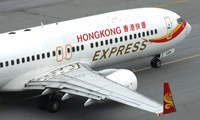Cover Story
MISSIONARY MAN
Hong Kong’s latest low-cost carrier, Hong Kong Express Airways, is up and running after its transformation from a full service regional airline. Convinced budget flying will be a booming business in Hong Kong, its boss Zhang Qiang is zealous about his plans to rapidly expand the airline’s fleet and route network.
November 1st 2013
Zhang Qiang, the Mainland-educated and Black Belt Karate-trained president of newborn low-cost carrier (LCC), Hong Kong Express Airways, makes no apologies for his missionary zeal when it comes to his recently launched “baby”. Read More »
 |
| 'We see ourselves as bringing much needed competition and increased choice to Hong Kong aviation' |
| Zhang Qiang President Hong Kong Express |
He predicts the low-cost carrier will break even within two years and will achieve a 10% share of the Hong Kong passenger market “in the near future”.
He told Orient Aviation: “Using figures quoted by leading analysts, LCCs account for approximately 5%-6% of travel into and out of Hong Kong. If we look at Singapore, however, LCCs account for more than 30% of [airline travel].
“This says to us that there is enormous potential for LCCs in Hong Kong. We see no reason why LCCs cannot achieve at least 30% market share here within a reasonable period. Although we are worried about constraints on capacity while we wait for the new terminal and the planned third runway at the airport to be built.
“I would like to bring low fares travel to the people of Hong Kong, and to those people who have always dreamed of visiting Hong Kong, one of the world’s great cities. As Hong Kong’s low fares airline, we see ourselves as bringing much needed competition and increased choice to Hong Kong aviation. In addition, we will destroy the myth that a low-cost carrier cannot survive and prosper in Hong Kong.”
Hong Kong Express completed its transition from a struggling ten-year old regional airline to a budget operator last month with the launch of its first flights on October 27. It is operating daily flights to Chiang Mai, Sabah, Kunming, Phuket, Taichung, Tokyo Haneda and Osaka Kansai with a fleet of five A320s, configured with 174 all-economy seats. It intends to increase its fleet to 11 A320s by the end of next year, and bump it up to 30 by 2018,
Not surprisingly, the airline’s strategy for making significant inroads into the SAR’s passenger traffic revolves around the carrier being lean and mean. It says it can reduce per seat costs by up to 40% through increased aircraft utilization, with most of these savings being passed onto customers.
 |
The LCC is offering a one-way ticket to popular Kunming in Yunnan, excluding taxes and fuel surcharges, for US$38.44, less than half the price of a promotional ticket with full service carrier, Dragonair. Fares to resort island Phuket, in Thailand, are being launched at $47.47, a third of the fare proposed by the yet-to-be launched LCC rival, Jetstar Hong Kong.
The most expensive fares are to Tokyo’s Haneda, at $97.77, matching Osaka-based, low-cost carrier, Peach Aviation’s offerings.
Zhang told Orient Aviation the biggest challenges to its development are capacity restrictions at Hong Kong International Airport (HKIA) and the limited number of third party suppliers at HKIA offering airport services. “We would like to see an increase in the number of such suppliers to ensure the cost base of operating to and from Hong Kong is competitive,” he said.
| Start performer Zhang Qiang (Charles), the president of the Hong Kong’s latest low-cost carrier, Hong Kong Express, has had a stellar ride to the top, but his new job will be his greatest challenge. Zhang began his career in aviation after he graduated as a biochemical engineer from Nanjing’s co-educational Southeast University in 1991. He worked his way through the ranks of aviation maintenance companies to senior positions at passenger and cargo carrier, Hainan Airlines,and Shangai-based cargo airline, Yangtze River Express. Zhang, who says he is passionate about aircraft safety and maintenance, was awarded a Civil Aviation Aircraft Maintenance Personal Licence (1998) and a Civil Aviation Administration of China Maintenance Management Licence in 2006. Zhang took time out of the industry for postgraduate study at China Europe International Business School, as China/European Union joint venture global business school in Shanghai. Armed with an MBA, he was appointed chairman and president of Shanghai’s business jet venture, Deerjet, in 2010, a position he will continue to hold in parallel with the presidency of Hong Kong Express and president of Beijing Capital Airlines Company. Fluent in English and Mandarin, Mr. Zhang has a black belt in karate. |
Network development will focus on North Asian and Southeast Asian markets in its 2013-14 winter schedule, with only limited services to Greater China. “This is because our sister airline, Hong Kong Airlines, has an extensive Mainland Chinese network. We want to establish a complementary route structure that facilitates north-south traffic flows,” said Zhang.
“However, we certainly expect to significantly grow our Mainland Chinese operations in the coming years, targeting second and third level cities that are uneconomic for Hong Kong Airlines to operate. This is where guests will enjoy an increased choice enabled by our twin-brand with Hong Kong Airlines,” he said.
One thing Zhang is not concerned about is any competitive threat from a second LCC, in the form of Jetstar Hong Kong, if it secures clearance to fly. “Hong Kong is a highly competitive market served by most of the world’s major carriers as well as 15 or 16 LCCs. If Jetstar Hong Kong secures a licence and an Air Operators Certificate (AOC) to operate, it will simply be another competitor.
“That said, we are concerned about the short-term capacity constraints at HKIA – not just in terms of infrastructure such as terminal facilities and runways but also key specialist personnel such as pilots and engineers. Our contribution to the debate on Jetstar Hong Kong’s application has focused on this issue, as we do not want to see the experience of the travelling public constrained by overcrowding and delays at HKIA,” he said.
Hong Kong Express’ shareholders include casino tycoon, Stanley Ho, who is a major shareholder in Jetstar Hong Kong. Zhang dismisses any suggestion there could be conflict of interest about the investments.
“In respect of the question about shareholders, it is actually Dr Stanley Ho in a personal capacity who is one of the investors in Hong Kong Express. Whereas, it is Shun Tak Holdings that is the investor in Jetstar Hong Kong. It is well known that Dr Ho and Shun Tak are investors in many companies in Hong Kong and Macau, and, in some cases, competing companies. We look forward to a continued strong relationship with Dr Ho as one of our shareholders,” Zhang said.
| 'I would like to bring low fares travel to the people of Hong Kong and those people who have always dreamed of visiting Hong Kong, one of the world’s great cities' |
| Zhang Qiang |
The transformation of Hong Kong Express from a full-service operator to a no-frills carrier began last May. A partner airline with HNA - controlled Hong Kong Airlines, the airline had its own air operators certificate (AOC) in it former structure, but essentially operated as part of its sister carrier’s network. Its fleet of B737-800s has been phased out in favour of A320s.
“It’s almost a start-up without being a start-up. The obvious advantage is that the AOC was in place and was being operated. Therefore, there has been no need for a re-application. We simply had to update our operating procedure,” explained the airline’s deputy chief executive, Andrew Cowen.
For example, there were five cabin crew for the original full-service, two-class configuration. They have been reduced to four. “To go from five to four cabin crew and from giving free meals to selling meals when you already were selling onboard duty free is not that big a change really,” said Cowen.
Critical to the plan was re-defining the roles each of the group’s airlines so that the new airline would not be weighed down by legacy issues.
| Pilots from across the globe Hong Kong Express continues to hire staff for its expansion, from its base int Tung chung, a few kilometres from Hong Kong International Airport. “We are hiring one person every two days. We expect to create something like 350 jobs next year and actually about 77% of employees are Hong Kong citizens. Most of the rest are expatriate pilots because there is a persistent pilot shortage in Hong Kong. We can’t generate enough ourselves. “They come from all over, some 30 odd nationalities from Russians to Brazilians. In the medium term we do want to look at doing our own pilot training”, said Zhang. |
“As you target routes from visiting friends and relatives to worker traffic or leisure and very small businesses, Hong Kong Airlines can move to a more focused full-service carrier. Until now it has been trying to do both. It sort of comes in between Cathay and the LCCs, which brought us back to the strategy of separating them. It makes sense to utilize the AOCs to address the market in a more broadly based, but focused way,” said Cowen.
“We will be serving Hong Kong’s people whereas Hong Kong Airlines has been mostly about Mainland China inbound to Hong Kong and carrying people on to places like Kota Kinabalu,” he said.
“With the separation the LCC will do many of these routes with a cost structure that is more appropriate to the competition and the destination. It allows us to clean up what each airline does. So Hong Kong Airlines will be mostly Mainland China inbound to Hong Kong and we will be mostly Hong Kong to Mainland China outbound. You are then better serving both ends of the market”.
Before its launch, the airline ran a Facebook competition that asked followers where they wanted to fly. The overwhelming favourite was Japan, which is reflected in the carrier’s route planning.
“Korea is right up there,” said Cowen.
“We certainly see a very significant North Asia opportunity and that includes Taiwan. We will be looking more at China because we want to establish three legs to the business: North Asia, Greater China and then Southeast Asia.”
Airport congestion is a concern, he said, but the issue is being addressed. “Most importantly, it is Hong Kong and at peak times slots are difficult. But the advantage of an LCC is you don’t need to have a service departing at 9am every day. If you are a flag carrier, you must have a 9am service to Beijing or Shanghai. We will use pricing to encourage people to travel at slightly different hours.
“This fits with the utilization; to get out before the rush, let the rush happen and by this time we are safely on our return leg and are landing in the troughs. We have quite carefully built our schedule that way. Spread out during the day and we are obviously going to do some overnight flights as part of utilization and network spread,” Cowen said.